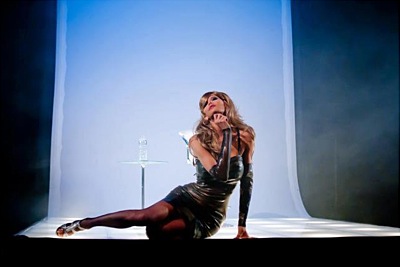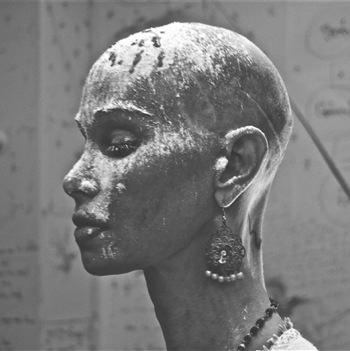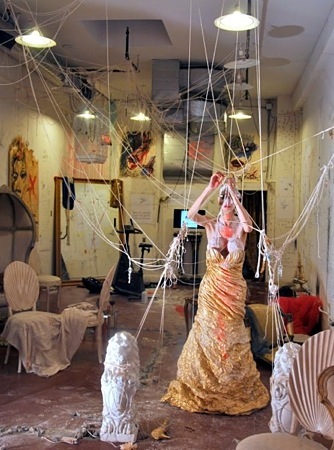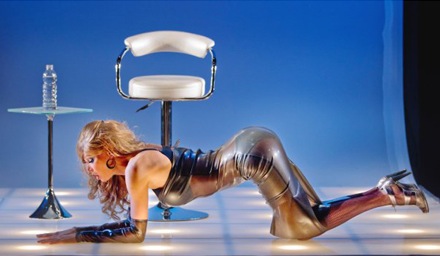Spotlight on Alumni: Nina Arsenault
 Nina Arsenault
Nina Arsenaultphoto by Alejandro Santiago
Performer, playwright and 2012 Bryden Award Winner (“Redefine the Possible”) Nina Arsenault (MFA Playwriting 2000, BFA 1996) speaks candidly about her experience at York, pre- and post- her gender transition, and the people from York who've had the strongest impact on her life as an artist.
Following my gender transition I was very isolated and alienated in culture. I was working alone inside my apartment as a sex worker and human rights were such that it didn't feel like there were many places that I felt safe as a transsexual—really only nightclubs, the strip club where I worked and Church Street. I had given up hope that I could work as a professional artist. Transphobia, overt and implied, was so intense—even in places where people said it didn't exist. Things have improved so much in only five years! (Still far to go, though.) When I got onto social networking (Facebook) in 2007 I had a relatively small voice in culture, and it gave me the opportunity to be creative. Also, for people to notice the things I was doing. I was a club hostess. I did photo shoots. I spent days putting together glamourous outfits. OMG, so many tricks to pay for all those glittery dresses! I never listened to any of the online haters who told me to be quiet. The virtual world was one of the only places I had for self-expression. Then, some artists and institutions, like Sky Gilbert and Buddies in Bad Times noticed me. They were interested in some of the things I was doing and my point of view. A conversation about working together began.
 photo by D'Anilo Ursini
photo by D'Anilo UrsiniSince then I've toured my one woman show The Silicone Diaries across Canada. It was directed by a brilliant man, Brendan Healy, the Artistic Director of Buddies in Bad Times Theatre. I've created some photographic pieces I truly love with Bruce LaBruce who is extremely fierce. Also, Istvan Kantor and Jordan Tannahill. In 2012, at SummerWorks I did a durational performance called 40 Days + 40 Nights: Working Towards a Spiritual Experience which was a very deep investigation into ecstasy and agony—one of the most vital times of my life that I will forever be grateful for. Judith Rudakoff, who was my professor in undergraduate and graduate work, edited a brilliant book—calling on other artists, critics and scholars to speak about my work and the issues it raises. It's called TRANS(per)FORMING Nina Arsenault: An Unreasonable Body of Work. It's been such an incredible journey!
Currently, I am focusing on dance and video, but I also do visual art works, write poetry and make installations. No matter what I am going through I continue making work. For a few years, I took every opportunity that was offered to me. I have never had a career plan because I didn't think it was possible for me to have a career. Honestly, I thought I would be dead before forty because many of the transwomen I knew in the generation above me died or disappeared around that time. (Now I think I might actually live forever.)
 photo by Robert Wallace
photo by Robert WallaceI suppose thinking that I only had a few years left meant it was possible for me to take greater personal risks in the artworks. I had a now-or-never mentality about that.
Working as an artist continues to be a way of survival to me. A way of being with my body. A way of living in a world that always feels potentially hostile. Also, a way of dealing with the existential pain of life.
It's the way I can search to see reality for what it is, to be seeking truth, to engage with the rigour of perceiving something immense, and also to be able to process the intensity of it.
Moreover, I don't differentiate between professional art work, amateur art works and art therapy. It is all the same thing to me. Often, the art-as-therapy creates the most powerful cathartic works.
The most valuable things I learned at York:
1.) Find your erotic landscape. What version of 'you' gives you the greatest charge?
(from Judith Rudakoff)
2.) Most people think they are taking artistic risks, but they are only paying lip service to the idea of risk.
(Ron Singer)
3.) You have to be able to embrace paradox, and get in touch with your dark side. This does not mean acting “naughty.” You very have anti-social thoughts. Thoughts.
(Ines Buchli)
4.) Take voice work. Even if you never have a career in theatre, the ability to breathe, to be in the moment –what it will do to your presence– will always make you more successful at whatever you are doing, and will make life better. It will make sex better. It will make you love more. Life will be more compelling. Even if you don't understand why, do it anyways. If you hate it, then just be a bad student of this work. Trust.
(Rae-Ellen Bodie)
5.) You can look at people and think “You are so goddamn beautiful” and you can find things to fall in love with about them. It doesn't have to be creepy. It can be safe.
(Geoffrey Hyland)
6.) If you're going to be provocative, be boldly provocative and you better believe it.
(Ines Buchli)
7.) Look to work with people who you ADMIRE.
(Judith Rudakoff)
8.) The only way out is through.
(Judith Rudakoff)
9.) You're allowed to have secrets.
(Geoffrey Hyland)
 photo courtesty of The Ottawa Citizen
photo courtesty of The Ottawa CitizenDid relationships you made at York help you afterwards?
My relationship with Judith Rudakoff has been one of the most rewarding of my life. We have known each other so long, been through so many changes, and we have always found new ways to connect—it's profound to have that. To know and see someone so deeply through different works. I believe it is the most intimate way of knowing someone. Even more intimate than sex which can be faked or manipulative. More intimate than a marriage because married life is often about not being in the moment together.
I occasionally keep in touch with Geoffrey Hyland, but we live in separate countries. I chase him down because he's an incredible human being and does the most exquisite plays.
J. Paul Halferty and I went through undergrad together, and we talk about performance all the time. He is a constant source of inspiration.
My dear friend John Grundy was a political science major, brilliant and very enthusiastic about his field of study. The conversations we have cross-pollinate. His work seeps into mine, mine into his in strange and unexpected ways, just through us knowing each other. It's never explicit, only implicit.
But other than these four wonderful people, I have not really kept in touch with anyone else. And, that is also a good learning experience. I like reminding myself that I don't have to seek anyone's approval or try to be in the in-crowd because all of it will dissolve in time anyways. I like knowing that I just have to do the work I am passionate about.
Tips for students about to graduate and enter the job market?
I'm interested in artists, not careerists. I'm interested in people who are looking for truth, who want to speak truth and who want to affect truth. Also, for me the work really didn't get going until I was thirty-five. Before that I did lots of school, study and workshops. I think performance is one of if not the most challenging field to be successful in.